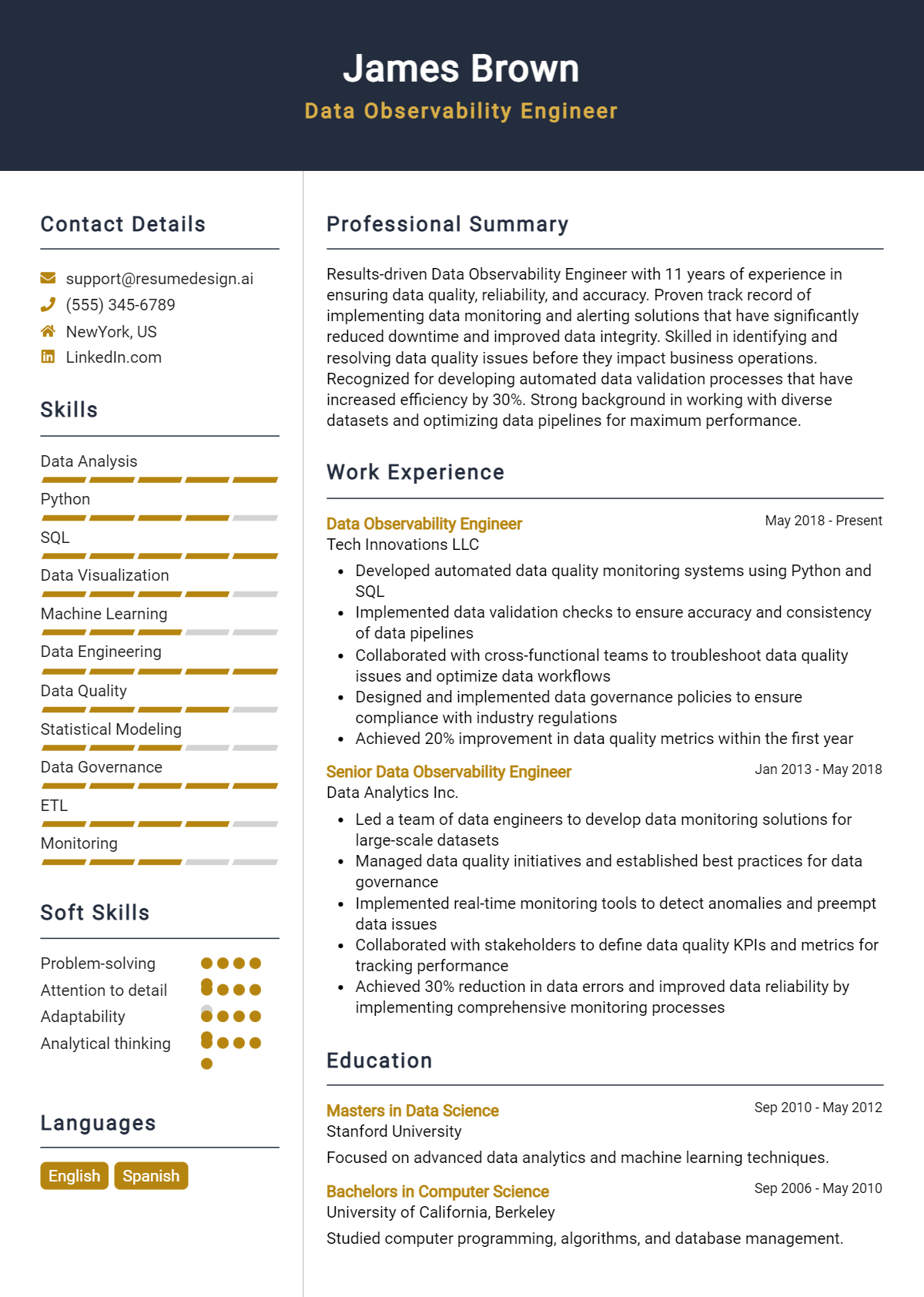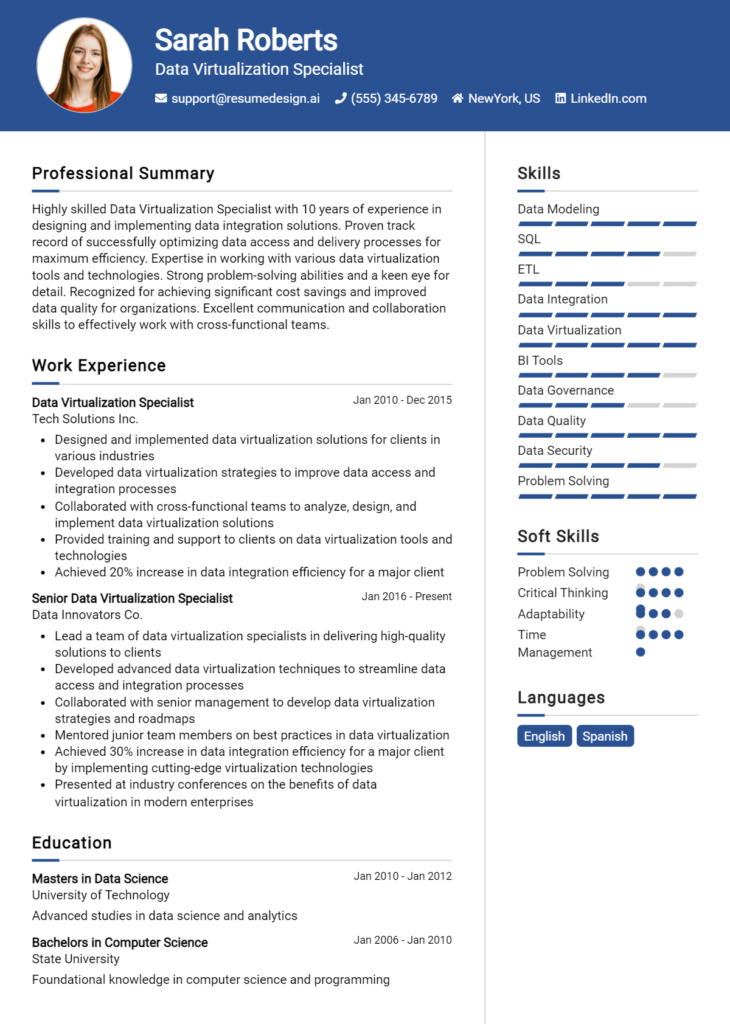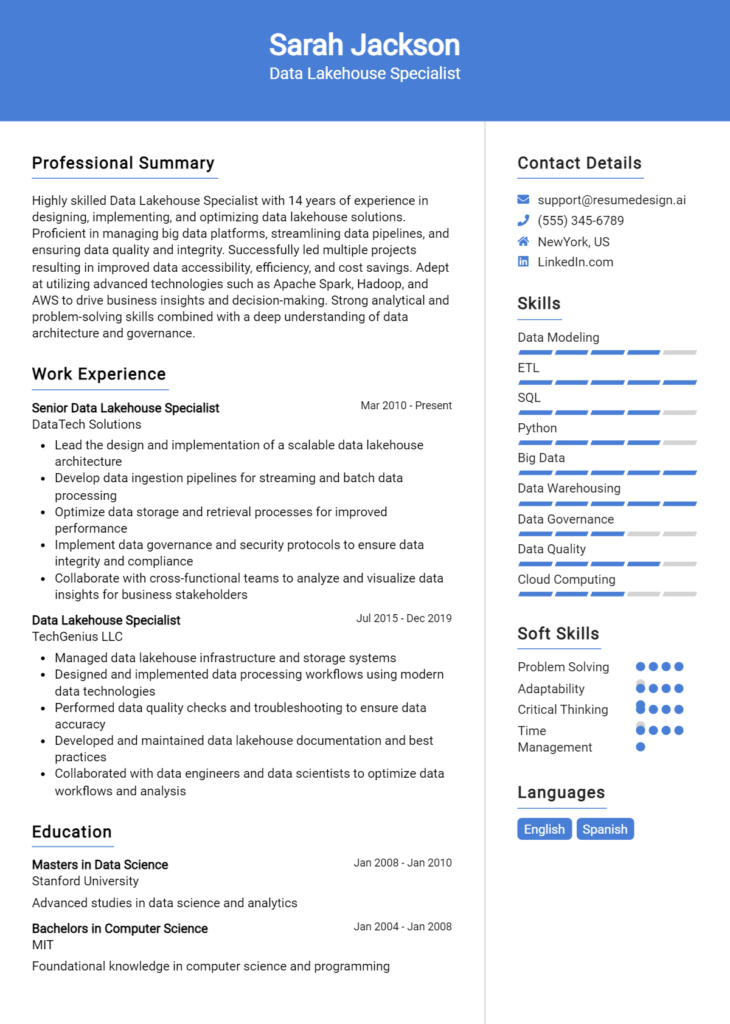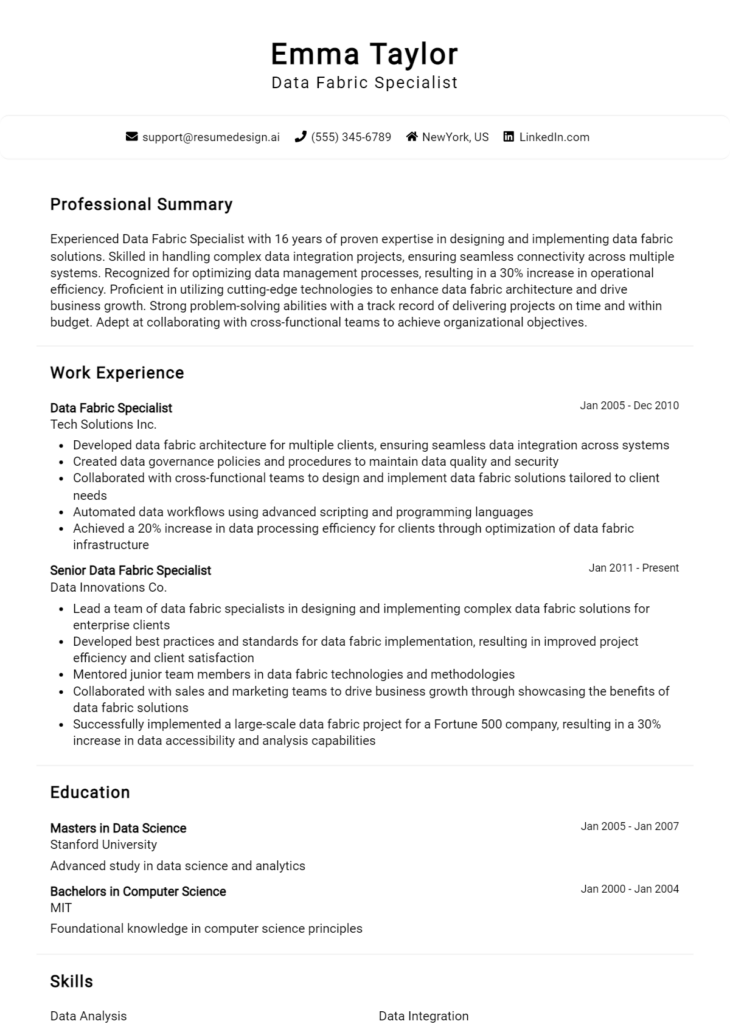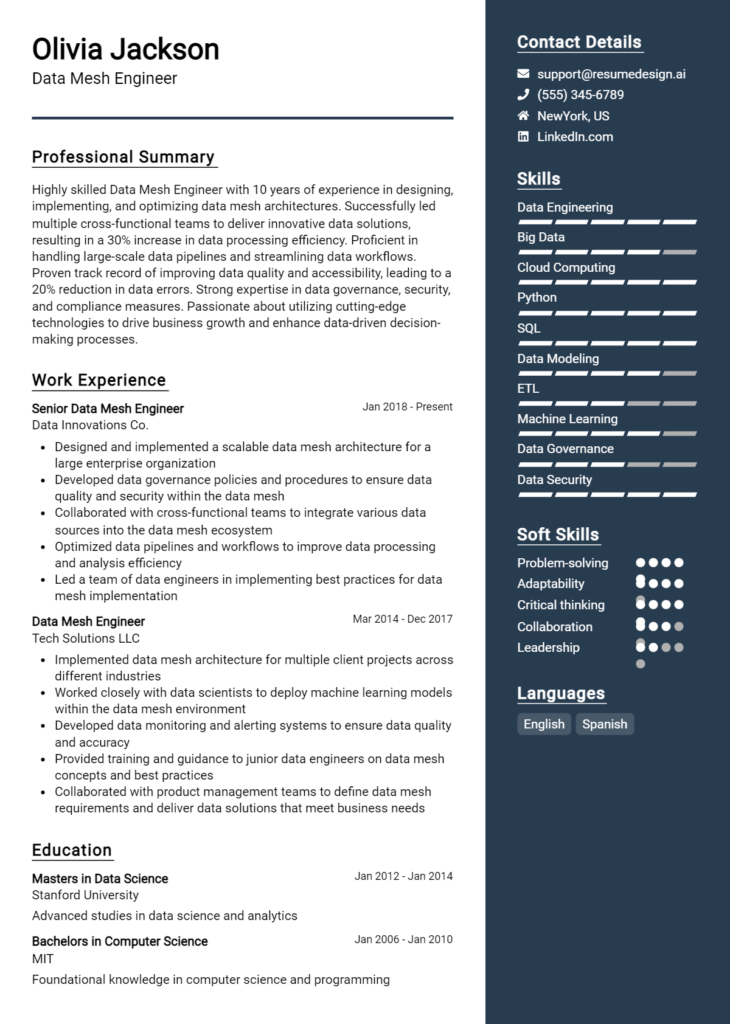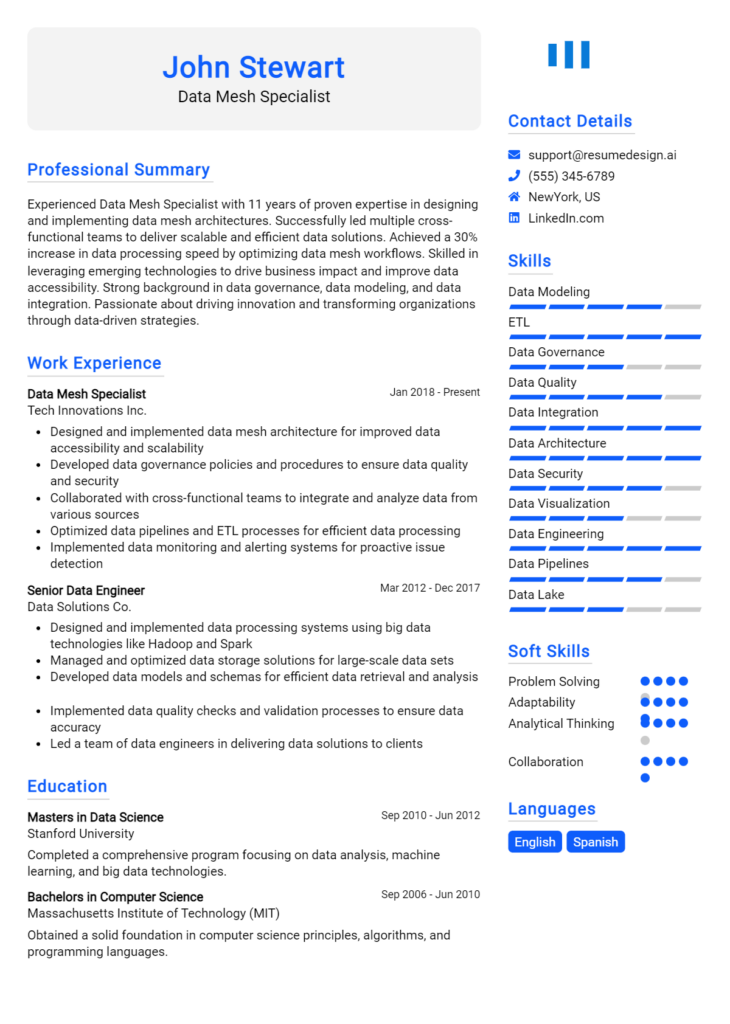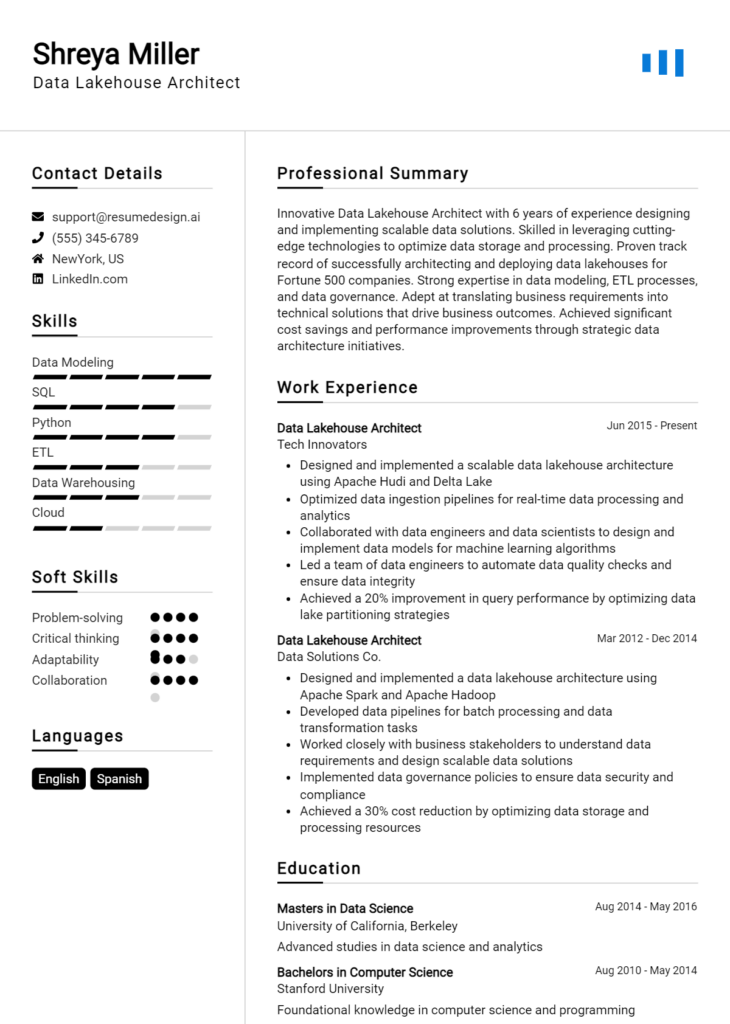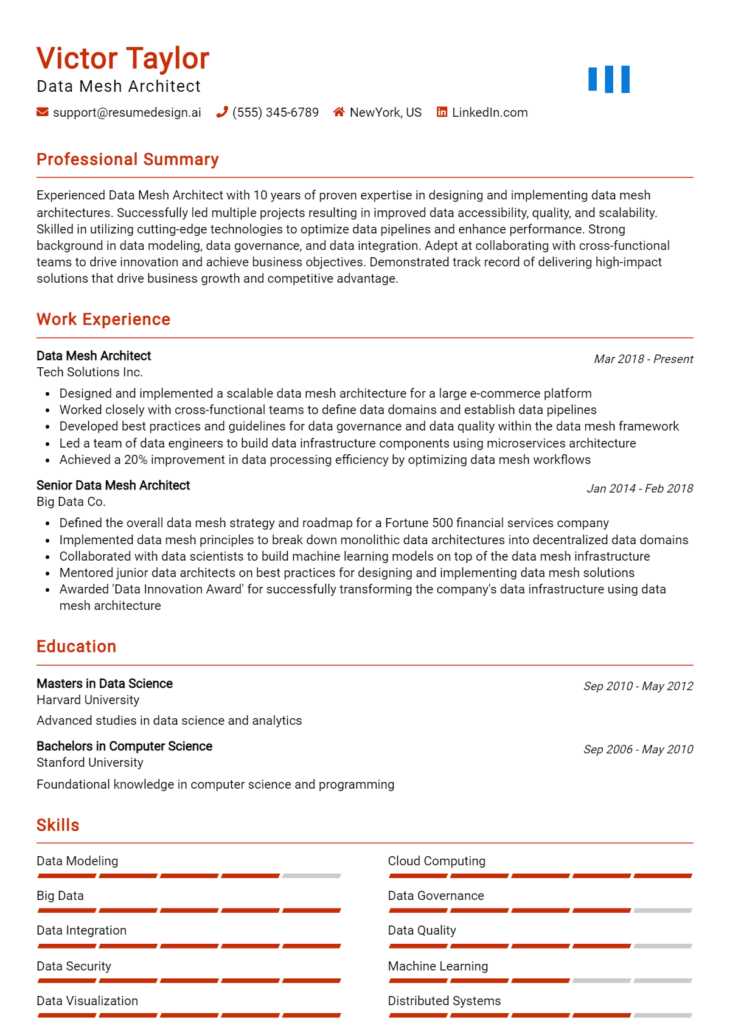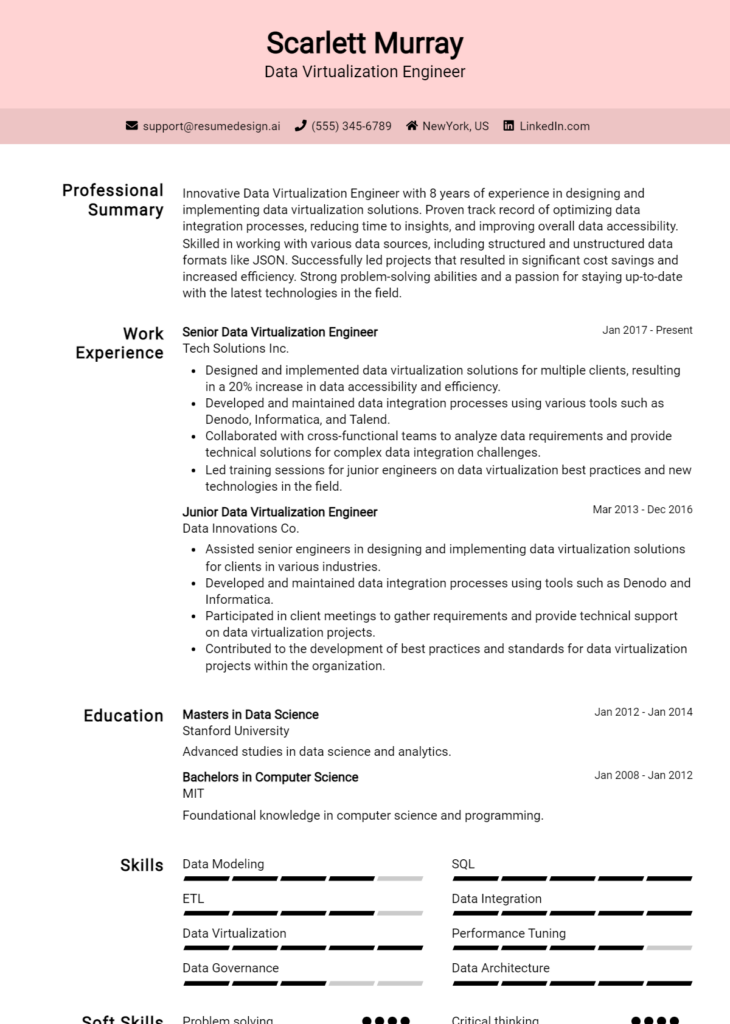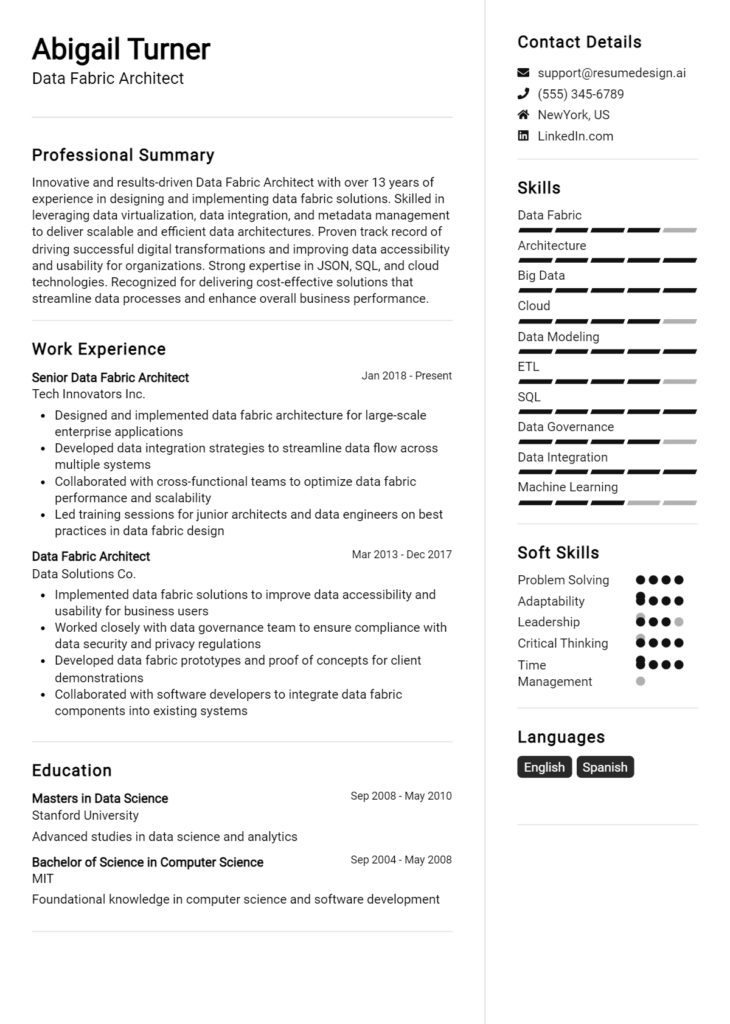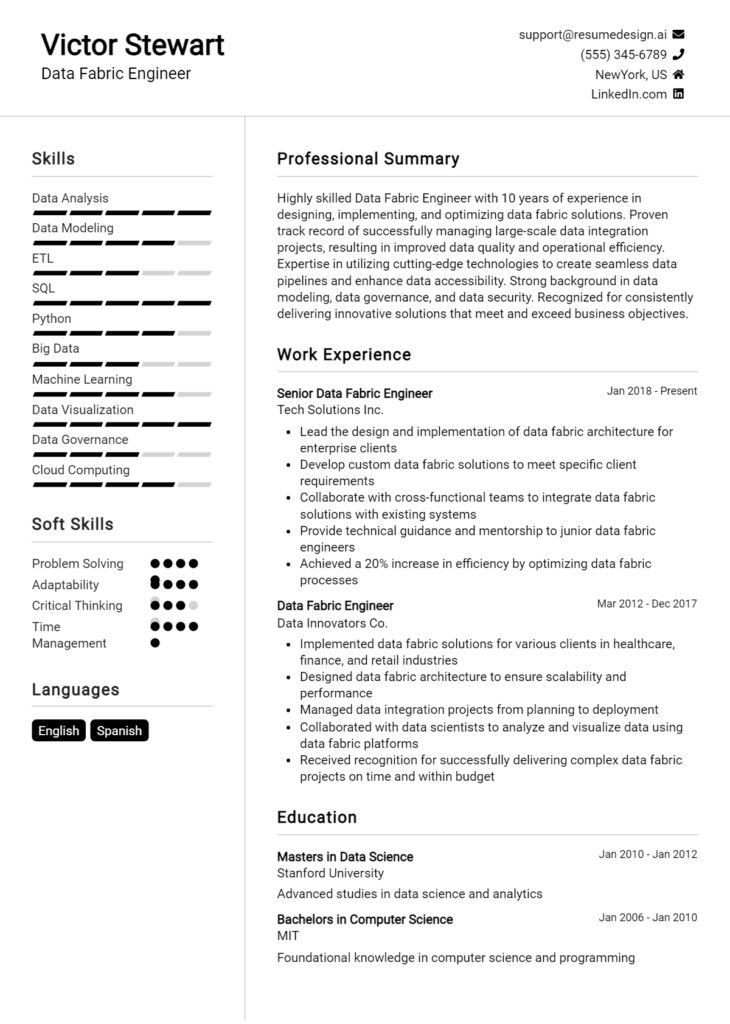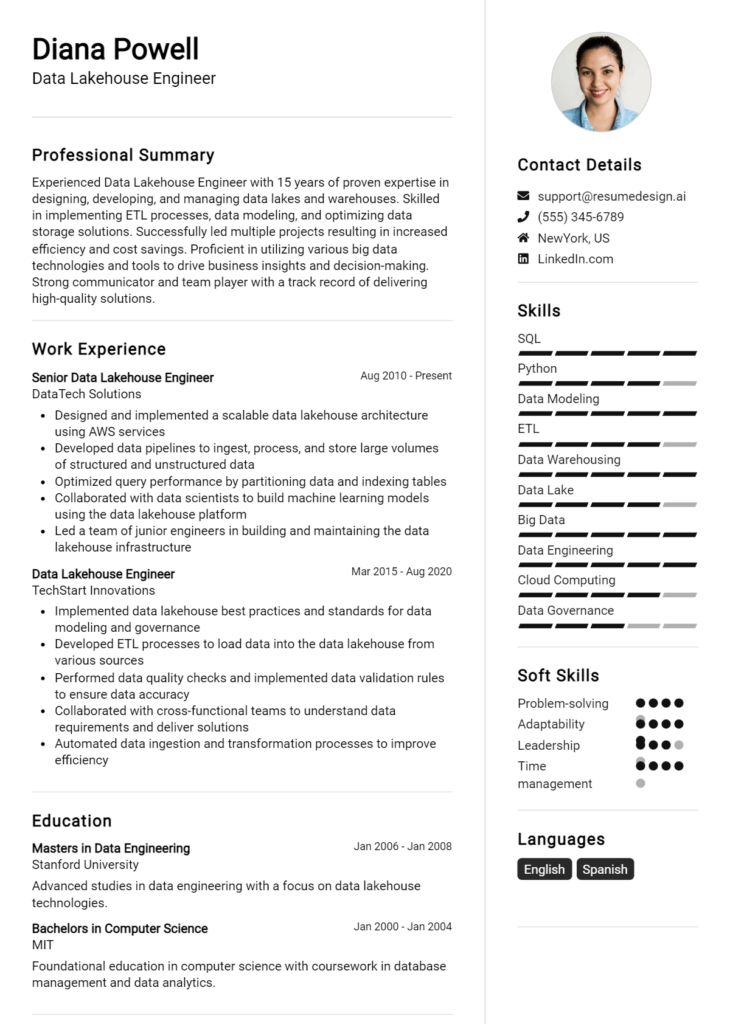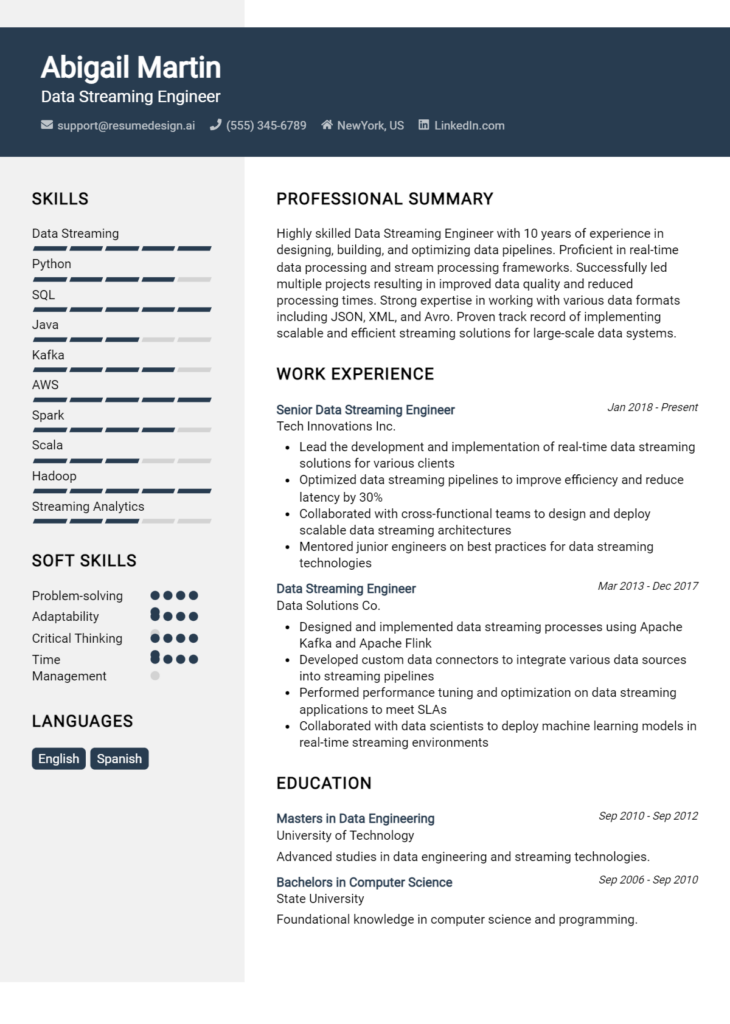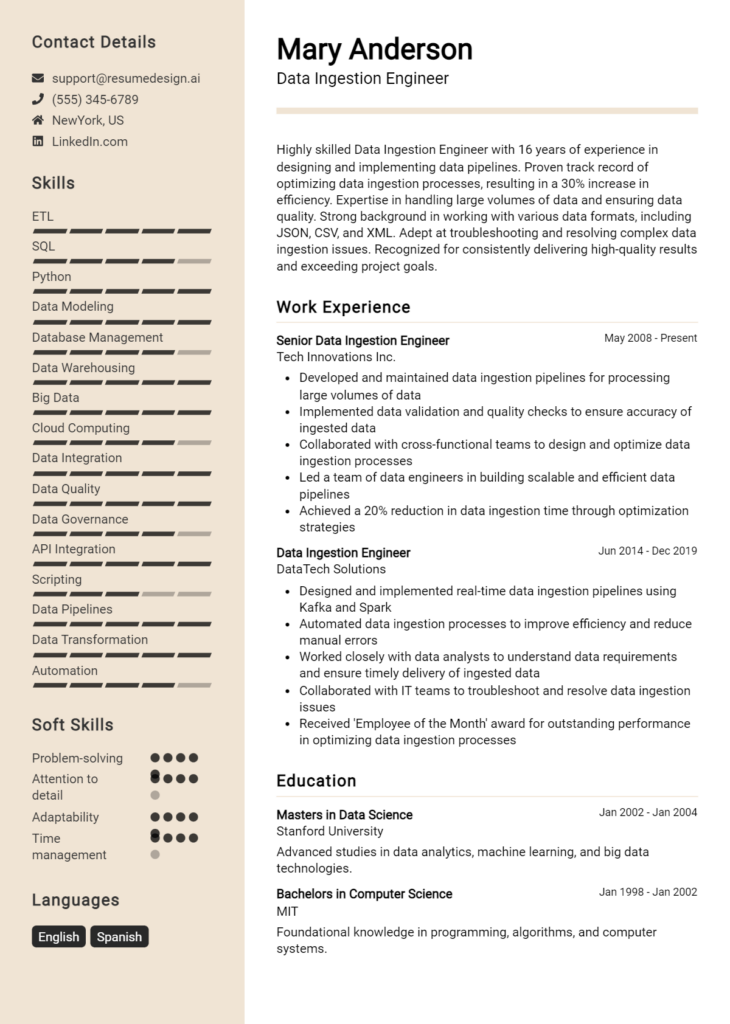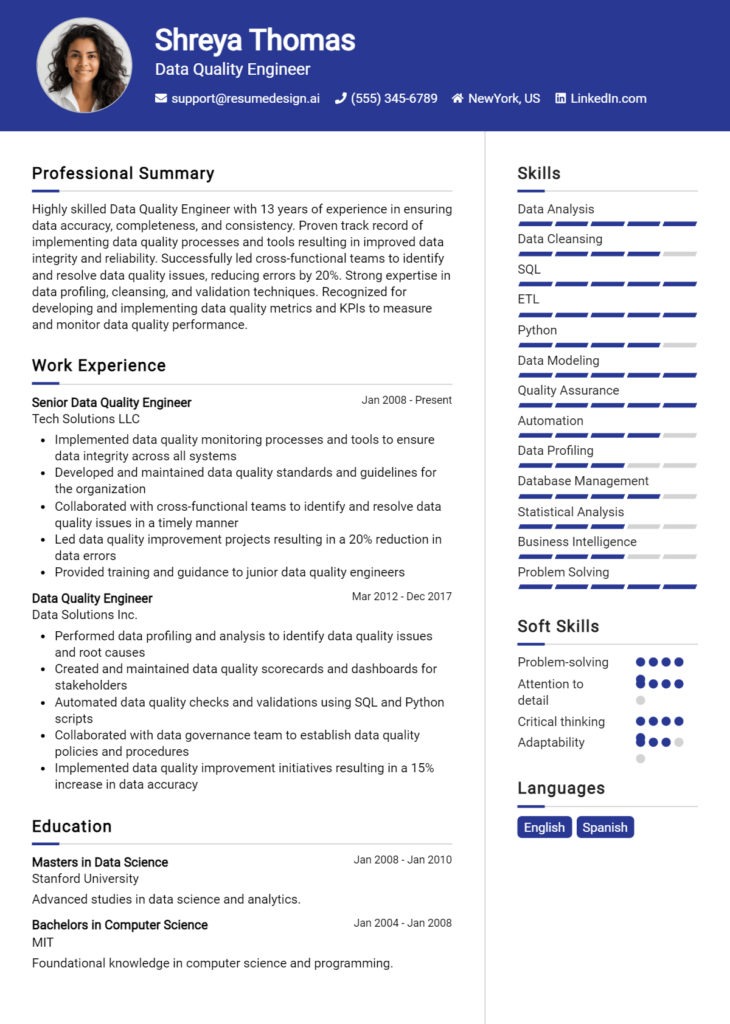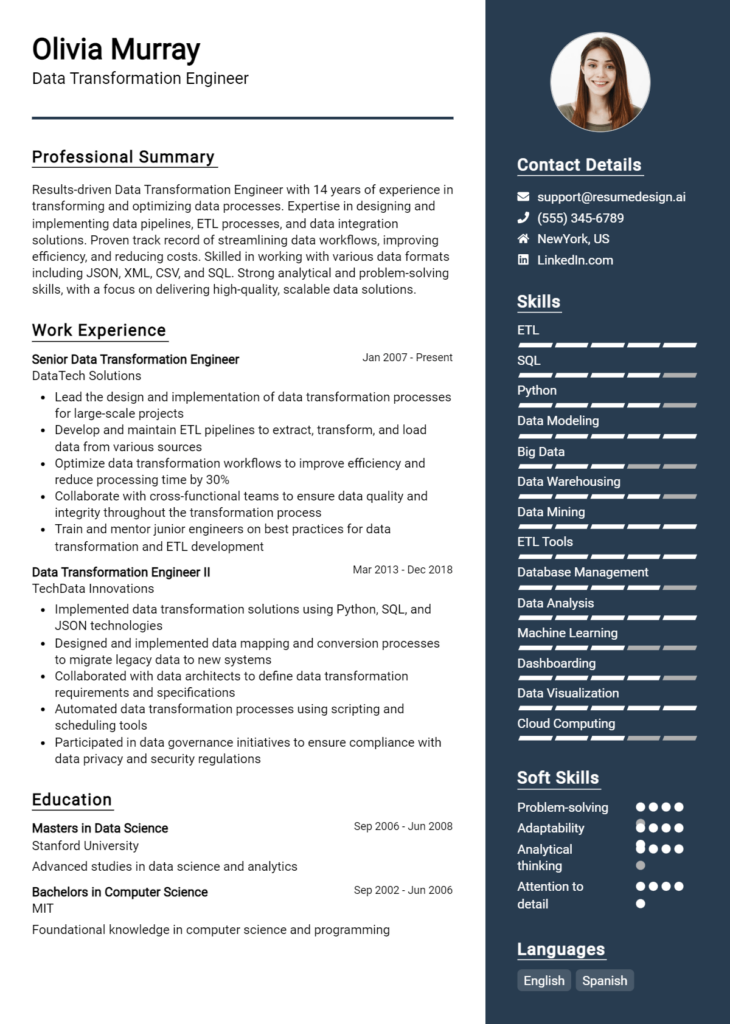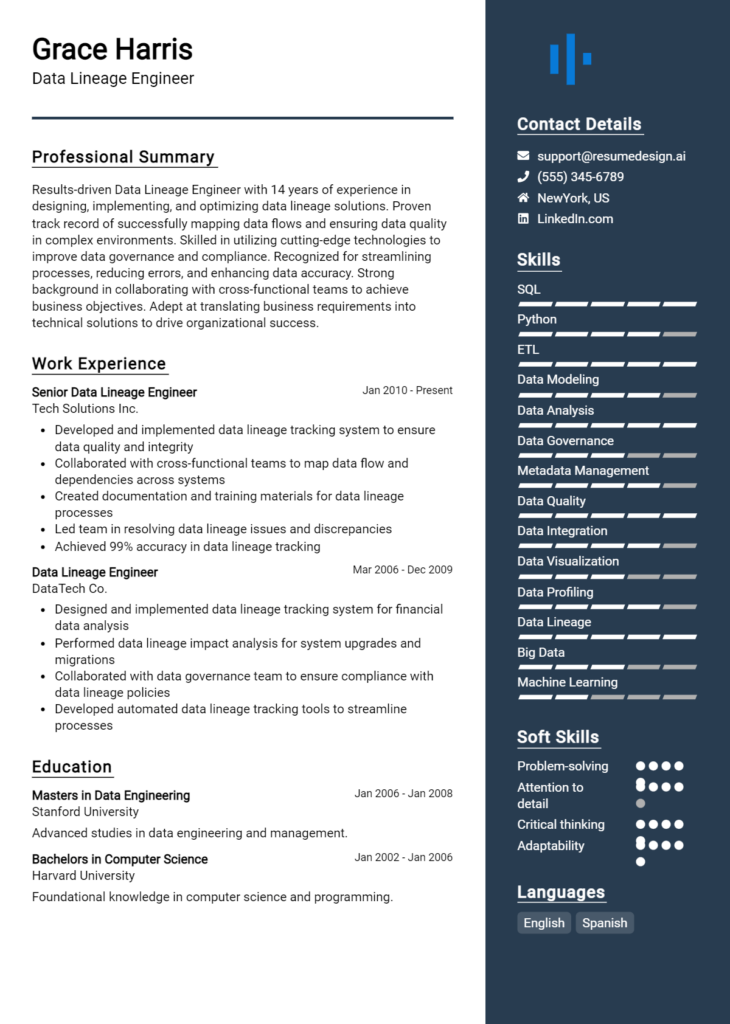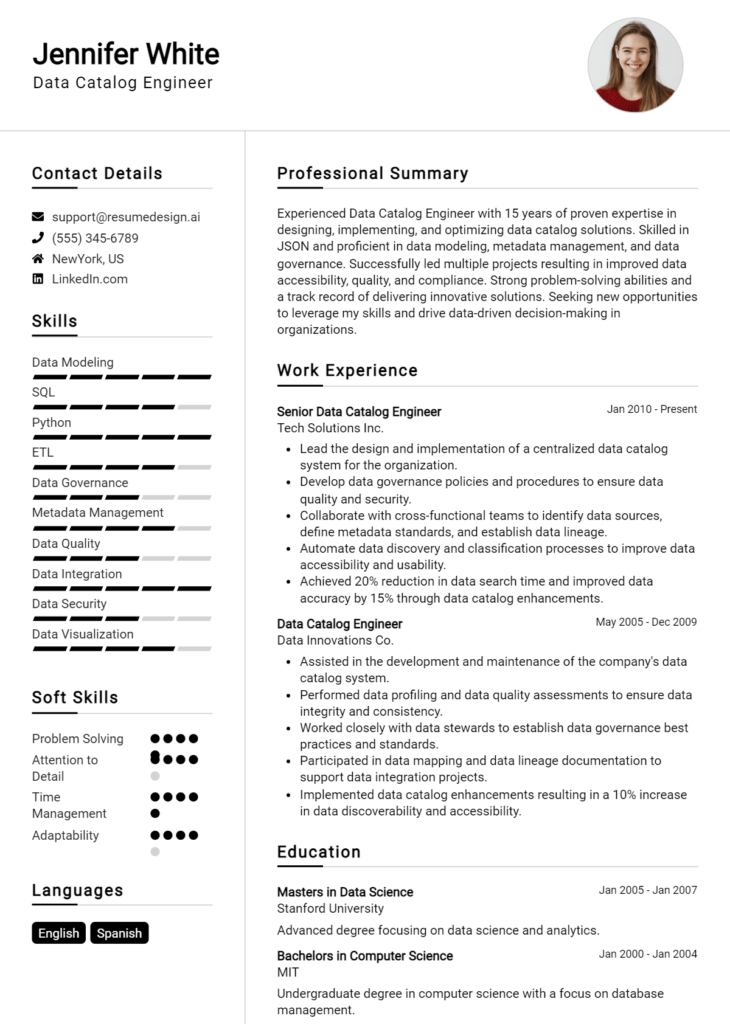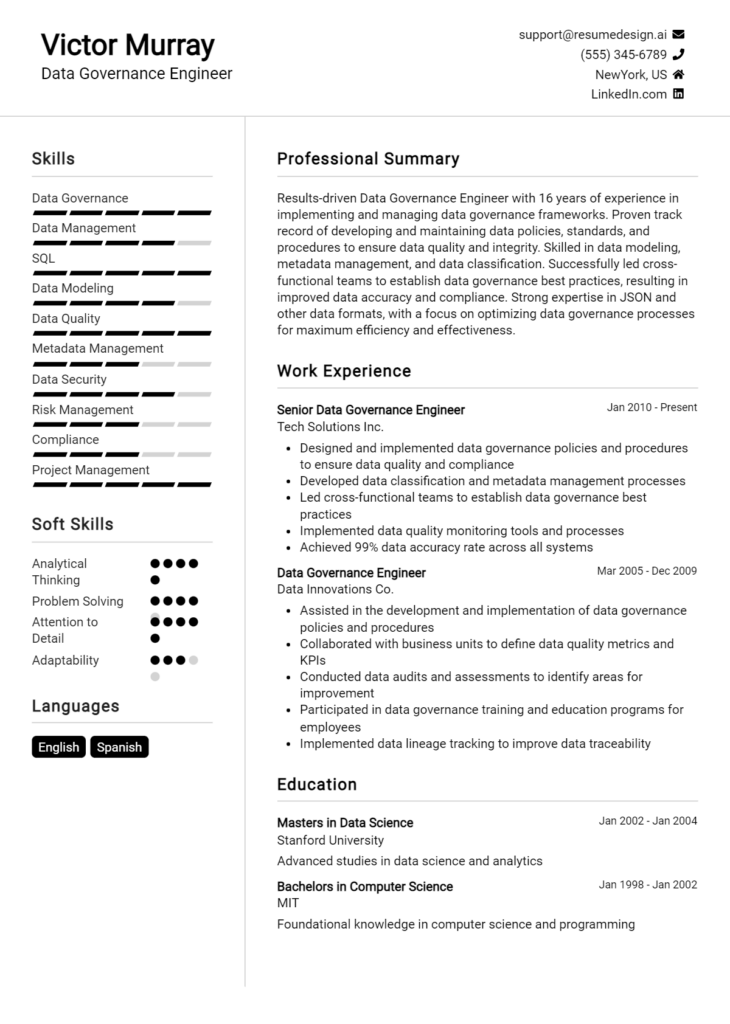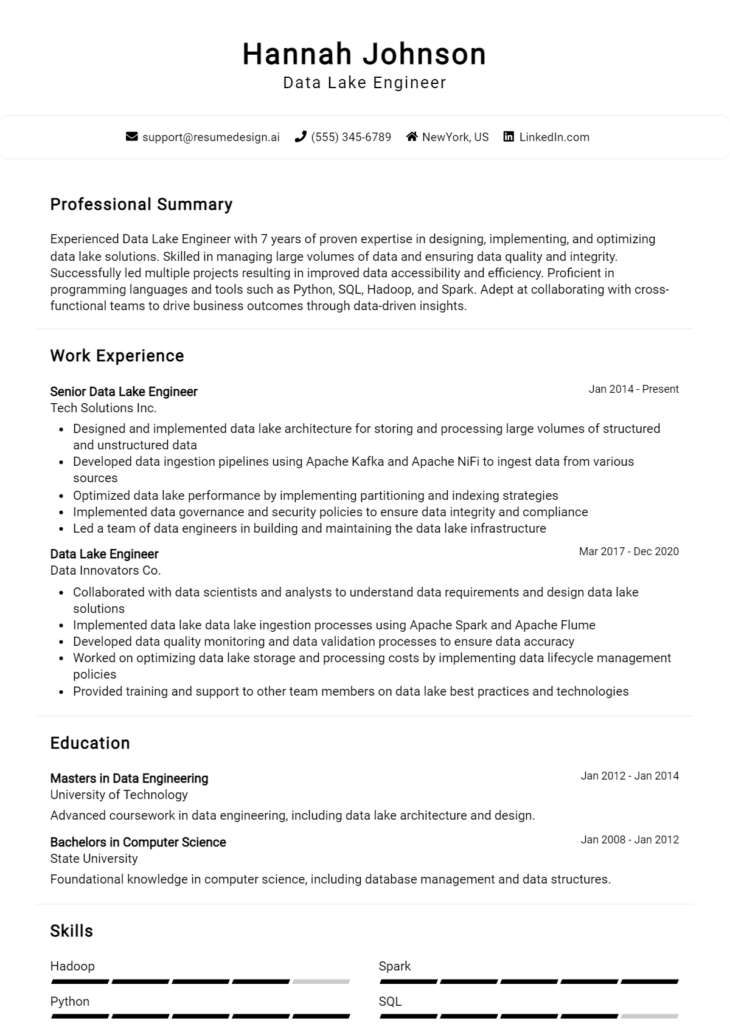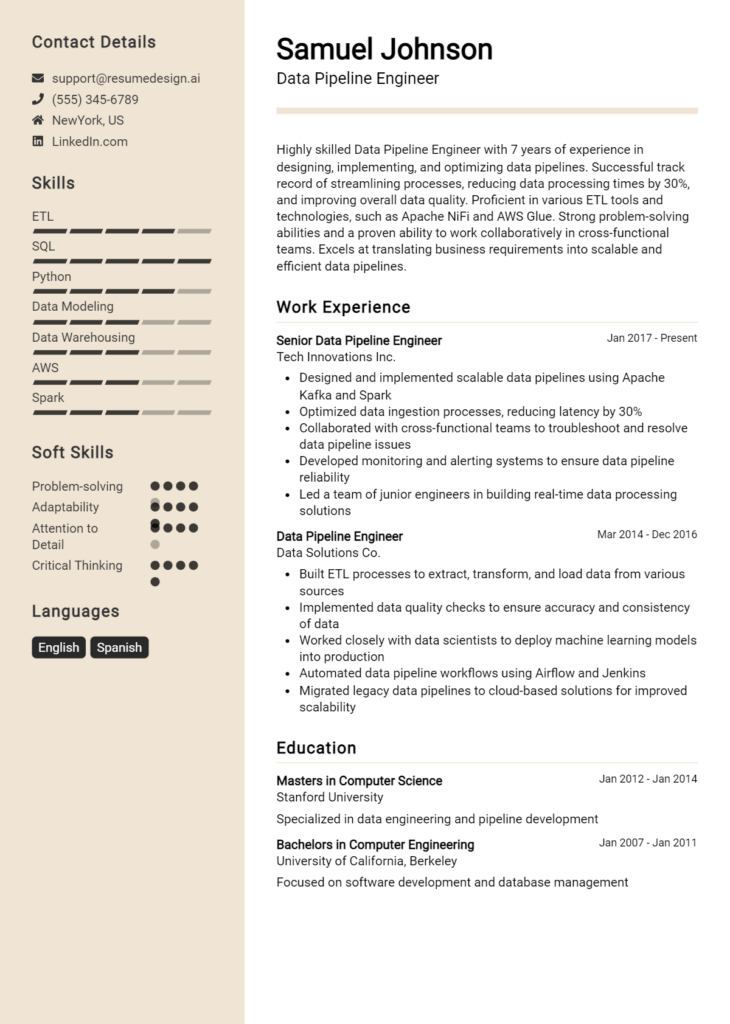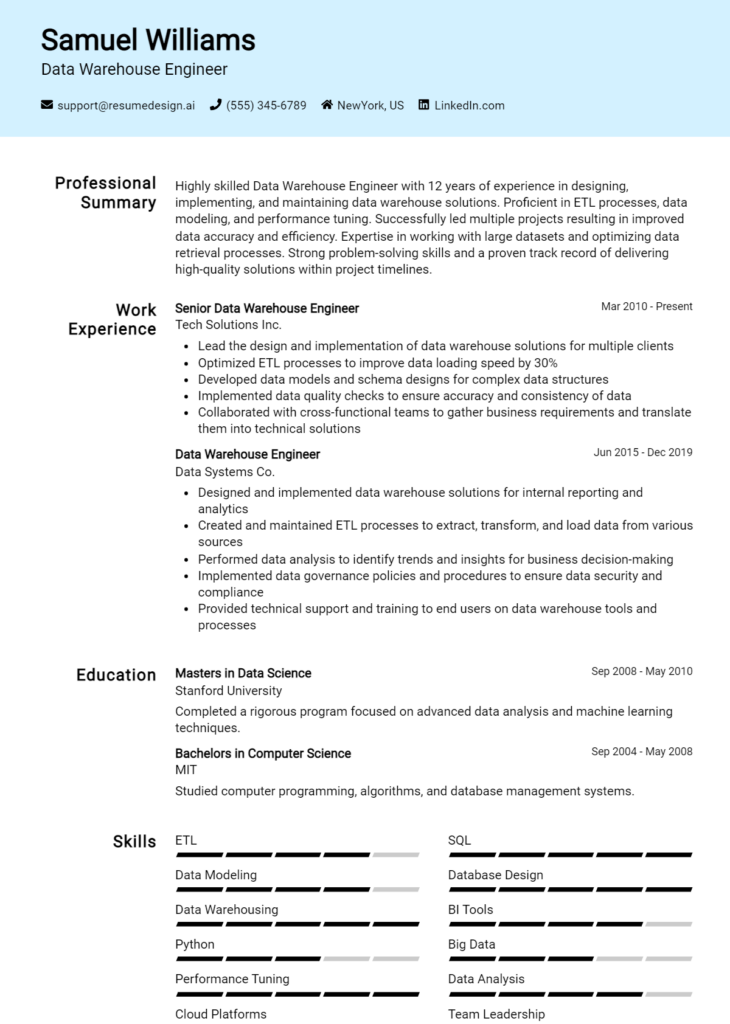Data Observability Engineer Core Responsibilities
A Data Observability Engineer plays a pivotal role in ensuring data integrity and reliability across an organization. They collaborate with data engineers, data scientists, and business stakeholders to implement monitoring frameworks that detect data anomalies and ensure data quality. This role demands strong technical skills in data analytics and programming, operational insights for process improvement, and exceptional problem-solving abilities to address data-related issues. A well-structured resume highlighting these qualifications can effectively communicate one's value in achieving organizational objectives.
Common Responsibilities Listed on Data Observability Engineer Resume
- Design and implement data observability frameworks to monitor data pipelines.
- Analyze and troubleshoot data anomalies and integrity issues.
- Collaborate with cross-functional teams to ensure data quality standards.
- Develop automated tests to validate data accuracy and consistency.
- Create and maintain documentation for data monitoring processes.
- Utilize data visualization tools to communicate findings and insights.
- Implement alerting mechanisms to notify stakeholders of data issues.
- Conduct regular audits of data systems and processes.
- Advise on best practices for data management and governance.
- Stay updated on emerging data technologies and trends.
- Provide training and support to team members on data observability tools.
High-Level Resume Tips for Data Observability Engineer Professionals
In the competitive landscape of data engineering, a well-crafted resume is crucial for Data Observability Engineer professionals. This document often serves as the first impression a candidate makes on a potential employer, making it essential to present not just skills, but also tangible achievements that demonstrate value. An effective resume should convey a deep understanding of data observability concepts and tools, showcasing the ability to maintain data integrity and reliability. In this guide, we will provide practical and actionable resume tips specifically tailored for Data Observability Engineer professionals to enhance their chances of standing out in a crowded job market.
Top Resume Tips for Data Observability Engineer Professionals
- Tailor your resume to match the job description, using keywords from the listing to highlight your relevant skills and experiences.
- Showcase your expertise in data observability tools and technologies, such as monitoring systems, data quality frameworks, and alerting mechanisms.
- Quantify your achievements with specific metrics, such as improvements in data accuracy or reductions in downtime, to provide concrete evidence of your impact.
- Highlight relevant experience in data engineering, analytics, and data governance to demonstrate a well-rounded background.
- Include projects or initiatives where you implemented data observability practices, detailing the challenges faced and solutions developed.
- Showcase your problem-solving abilities by describing complex data issues you have resolved in previous roles.
- Emphasize collaboration with cross-functional teams, highlighting your ability to work with data scientists, analysts, and IT departments.
- Stay updated with industry trends and best practices, showcasing your commitment to continuous learning and professional development.
- Incorporate soft skills, such as communication and teamwork, which are vital for collaborating with stakeholders and ensuring data-related objectives are met.
By implementing these tips, Data Observability Engineer professionals can significantly increase their chances of landing a job in this growing field. A resume that effectively highlights relevant skills, achievements, and industry knowledge can set candidates apart, making them more appealing to potential employers looking for top talent in data observability.
Why Resume Headlines & Titles are Important for Data Observability Engineer
In the competitive field of data observability, where organizations rely heavily on data integrity and performance monitoring, a well-crafted resume headline or title can make a significant difference in capturing the attention of hiring managers. A strong headline immediately summarizes a candidate's key qualifications in a succinct and impactful manner, allowing them to stand out in a crowded applicant pool. It should be concise, relevant, and directly aligned with the job being applied for, effectively setting the tone for the rest of the resume and leading to a more favorable impression.
Best Practices for Crafting Resume Headlines for Data Observability Engineer
- Keep it concise: Aim for one impactful phrase that captures your essence.
- Be role-specific: Clearly indicate your focus on data observability engineering.
- Highlight key skills: Incorporate relevant technical skills or tools you excel in.
- Include years of experience: Mention your level of expertise to add credibility.
- Use active language: Employ strong action verbs to convey your contributions.
- Tailor to the job: Customize your headline for each application to align with the job description.
- Avoid jargon: Use clear, straightforward language to ensure clarity and impact.
- Showcase accomplishments: If possible, integrate a specific achievement or measurable outcome.
Example Resume Headlines for Data Observability Engineer
Strong Resume Headlines
"Data Observability Engineer with 5+ Years of Experience in Ensuring Data Integrity and Performance"
"Proficient Data Observability Engineer Specializing in Real-Time Monitoring and Anomaly Detection"
"Results-Driven Data Observability Expert with a Proven Track Record of Optimizing Data Pipelines"
Weak Resume Headlines
“Engineer Looking for Opportunities”
“Data Professional”
The strong headlines are effective because they clearly communicate the candidate's specific role, expertise, and key achievements, making them memorable and relevant to hiring managers. In contrast, the weak headlines fail to provide any substantial information, leaving hiring managers without a clear understanding of the candidate's qualifications or how they fit the role, ultimately diminishing their chances of making a positive impression.
Writing an Exceptional Data Observability Engineer Resume Summary
A well-crafted resume summary is crucial for a Data Observability Engineer, as it serves as the first impression that captures the attention of hiring managers. In a competitive job market, a strong summary succinctly highlights key skills, relevant experience, and notable accomplishments, allowing candidates to stand out. It should be concise yet impactful, tailored to the specific job description, and designed to convey the candidate's unique value proposition to potential employers. A compelling summary sets the tone for the entire resume and encourages hiring managers to delve deeper into the applicant's qualifications.
Best Practices for Writing a Data Observability Engineer Resume Summary
- Quantify Achievements: Use specific numbers and metrics to demonstrate the impact of your work.
- Focus on Relevant Skills: Highlight technical skills and tools that are directly applicable to data observability.
- Tailor the Summary: Customize your summary for each job application to align with the job description and company goals.
- Use Action Words: Begin sentences with strong action verbs to convey confidence and proactivity.
- Keep it Concise: Aim for 2-4 sentences that succinctly summarize your qualifications without unnecessary fluff.
- Showcase Industry Knowledge: Mention familiarity with industry standards and best practices in data observability.
- Include Certifications: If applicable, reference relevant certifications that enhance your credibility in the field.
- Highlight Problem-Solving Skills: Emphasize your ability to identify and resolve data quality issues effectively.
Example Data Observability Engineer Resume Summaries
Strong Resume Summaries
Results-driven Data Observability Engineer with over 5 years of experience in implementing robust monitoring solutions, achieving a 30% reduction in data pipeline failures through proactive anomaly detection and remediation strategies.
Detail-oriented professional with a proven track record in leveraging advanced data quality frameworks, successfully improving data accuracy by 25% while managing cross-functional teams to enhance observability practices across the organization.
Experienced Data Observability Engineer skilled in using tools like Apache Kafka and Prometheus; led initiatives that increased data visibility by 40%, enabling real-time insights and strategic decision-making.
Data observability expert with extensive experience in cloud environments, adept at implementing monitoring solutions that improved incident response times by 50%, ensuring high data integrity and reliability.
Weak Resume Summaries
I am a Data Engineer looking for a position in data observability. I have experience in data-related tasks and want to help companies improve their data.
Technical professional with skills in data monitoring and analytics seeking a role where I can contribute to data quality improvements.
The examples provided illustrate clear distinctions in quality. The strong summaries effectively quantify achievements, specify relevant skills, and demonstrate a direct connection to the role of a Data Observability Engineer. In contrast, the weak summaries lack specificity, fail to highlight measurable outcomes, and present a generic overview that does not engage the reader. This reinforces the importance of a targeted and impactful resume summary in the job application process.
Work Experience Section for Data Observability Engineer Resume
The work experience section of a Data Observability Engineer resume is a vital component that provides insight into a candidate's technical abilities, team management skills, and capability to deliver high-quality data solutions. This section allows candidates to demonstrate their expertise in various data observability tools and methodologies, while showcasing their experience in leading projects and collaborating with cross-functional teams. By quantifying achievements, such as improved data quality metrics or successful project deliveries, and aligning their experience with industry standards, candidates can effectively convey their value to potential employers.
Best Practices for Data Observability Engineer Work Experience
- Highlight specific technical skills and tools used in previous roles, such as data monitoring platforms and analytics technologies.
- Quantify achievements with metrics, such as percentage improvements in data quality or reductions in incident response time.
- Demonstrate leadership by detailing experiences in managing teams and driving projects to successful completion.
- Include examples of collaboration with other departments, showcasing cross-functional teamwork and communication skills.
- Tailor descriptions to align with the job description, emphasizing relevant experiences that match the desired qualifications.
- Use action verbs to convey a proactive approach and to articulate the impact of your contributions.
- Keep descriptions concise yet informative, focusing on results and outcomes rather than just responsibilities.
- Incorporate industry terminology to demonstrate familiarity with current trends and standards in data observability.
Example Work Experiences for Data Observability Engineer
Strong Experiences
- Led a cross-functional team to implement a data observability solution that increased data accuracy by 30%, resulting in cost savings of $150,000 annually.
- Developed and deployed automated monitoring scripts that reduced data incident response time by 50%, significantly improving overall data reliability.
- Collaborated with data engineering and analytics teams to establish a comprehensive data quality framework, leading to a 25% reduction in data-related errors.
- Championed the adoption of new observability tools, training a team of 10 engineers, which enhanced the team's data governance practices and compliance by 40%.
Weak Experiences
- Worked on data projects without specifying any outcomes or contributions.
- Assisted in monitoring data processes, but failed to explain the impact or results of the work.
- Managed a team but did not provide details on leadership style or achievements.
- Involved in data quality initiatives with no quantifiable improvements or metrics shared.
The strong experiences are considered effective because they provide clear, quantifiable outcomes and demonstrate leadership and collaboration, illustrating the candidate's impact on their previous organizations. In contrast, the weak experiences lack specificity and measurable results, making it difficult for potential employers to assess the candidate's true capabilities and contributions to past projects.
Education and Certifications Section for Data Observability Engineer Resume
The education and certifications section of a Data Observability Engineer resume plays a vital role in showcasing a candidate's academic foundation and commitment to professional development. This section not only reflects the candidate's educational qualifications but also highlights industry-relevant certifications and specialized training that are crucial for excelling in the field of data observability. By including relevant coursework and certifications, candidates can significantly enhance their credibility and demonstrate their alignment with the specific requirements of the job role, showcasing their dedication to continuous learning and expertise in data management and analysis.
Best Practices for Data Observability Engineer Education and Certifications
- Focus on relevant degrees such as Computer Science, Data Science, or Information Technology.
- Include industry-recognized certifications like Certified Data Management Professional (CDMP) or Google Data Analytics Professional Certificate.
- List specialized training courses that cover data observability tools and methodologies.
- Provide details on relevant coursework that pertains to data analysis, machine learning, or database management.
- Highlight any continuing education efforts, such as online courses or workshops in data engineering.
- Use clear, concise language to describe your educational background and credentials.
- Order the information chronologically, starting with the most recent qualifications.
- Emphasize any honors or distinctions received during your education or certification process.
Example Education and Certifications for Data Observability Engineer
Strong Examples
- M.S. in Data Science, University of California, Berkeley, 2022
- Certified Data Management Professional (CDMP), 2023
- Relevant Coursework: Advanced Data Analytics, Database Design, and Machine Learning Algorithms
- Completed Online Training in Data Observability using Apache Kafka and Spark, 2023
Weak Examples
- B.A. in Philosophy, State University, 2018
- Certification in Microsoft Office Applications, 2020
- Relevant Coursework: Introduction to Psychology, 2016
- Basic HTML and CSS Certification, 2019
The strong examples are considered relevant because they align directly with the skills and knowledge necessary for a Data Observability Engineer, showcasing advanced education and recognized certifications in the field. In contrast, the weak examples illustrate outdated or unrelated qualifications that do not support the candidate's fit for the role, failing to demonstrate the necessary expertise in data observability and analytics.
Top Skills & Keywords for Data Observability Engineer Resume
In the rapidly evolving field of data engineering, the role of a Data Observability Engineer has become increasingly crucial. This position focuses on ensuring the integrity, reliability, and performance of data systems. A well-crafted resume for a Data Observability Engineer must highlight a blend of both hard and soft skills to effectively communicate expertise and adaptability in this dynamic environment. Employers are looking for candidates who not only possess technical proficiency but also demonstrate strong problem-solving abilities, communication skills, and a proactive approach to data management. Including relevant skills in your resume can significantly enhance your appeal to potential employers, showcasing your suitability for the role.
Top Hard & Soft Skills for Data Observability Engineer
Soft Skills
- Strong analytical thinking
- Excellent communication skills
- Problem-solving mindset
- Attention to detail
- Collaboration and teamwork
- Adaptability to changing technologies
- Time management
- Critical thinking
- Customer-focused approach
- Proactive mindset
Hard Skills
- Proficiency in SQL and NoSQL databases
- Experience with data visualization tools (e.g., Tableau, Power BI)
- Familiarity with data quality frameworks
- Knowledge of observability tools (e.g., Grafana, Prometheus)
- Understanding of ETL processes and data pipelines
- Proficiency in programming languages (e.g., Python, Java)
- Experience with cloud platforms (e.g., AWS, Azure)
- Familiarity with machine learning concepts
- Knowledge of data governance and compliance
- Experience with monitoring and alerting systems
By emphasizing these skills on your resume, you can effectively showcase your qualifications and readiness to take on the challenges of a Data Observability Engineer position. Additionally, highlighting your relevant work experience can further solidify your candidacy and demonstrate your hands-on capabilities in data observability.
Stand Out with a Winning Data Observability Engineer Cover Letter
As a passionate and detail-oriented Data Observability Engineer with over five years of experience in data quality assurance and monitoring, I am excited to apply for the role at your esteemed organization. My extensive background in developing and implementing data observability frameworks aligns perfectly with your commitment to maintaining high-quality data pipelines and insightful analytics. At my previous position with XYZ Corp, I successfully led initiatives that enhanced data reliability by 30%, significantly improving decision-making processes across departments.
I am well-versed in utilizing cutting-edge tools such as Great Expectations and Monte Carlo to establish robust monitoring systems that provide real-time insights into data health. My technical acumen in SQL, Python, and cloud-based platforms has allowed me to construct automated workflows that proactively identify anomalies and minimize downtime. By collaborating closely with data scientists and engineers, I have effectively communicated complex findings and driven a culture of data stewardship within teams. I believe that fostering strong interdepartmental relationships is key to ensuring that data observability becomes an integral part of the organizational framework.
In addition to my technical skills, I bring a strategic mindset that emphasizes continuous improvement. I have a track record of not only addressing immediate data quality issues but also implementing long-term solutions that empower teams to take ownership of their data. I am particularly impressed by your organization's innovative approach to data-driven decision-making, and I am eager to contribute my expertise to help enhance your data observability practices further.
Thank you for considering my application. I look forward to the opportunity to discuss how my background, skills, and enthusiasm for data observability can contribute to the ongoing success of your team.
Common Mistakes to Avoid in a Data Observability Engineer Resume
When crafting a resume for a Data Observability Engineer position, it’s crucial to present your skills, experience, and accomplishments in a clear and compelling manner. However, many candidates make common mistakes that can detract from their qualifications and reduce their chances of landing an interview. Understanding these pitfalls can help you create a more effective resume that highlights your expertise in data observability and analytics. Here are some common mistakes to avoid:
Lack of Tailoring: Failing to customize your resume for the specific role can make it appear generic. Use keywords and phrases from the job description to align your experience with the employer’s needs.
Overcomplicated Language: Using jargon or overly technical language can alienate hiring managers. Aim for clarity and conciseness to ensure your achievements are easily understood.
Neglecting Quantifiable Achievements: Omitting metrics or specific accomplishments can weaken your resume. Always include data points (e.g., “improved data processing speed by 30%”) to demonstrate your impact.
Ignoring Soft Skills: Focusing solely on technical skills while neglecting soft skills can be a mistake. Highlighting communication, collaboration, and problem-solving abilities is essential in data observability roles.
Inconsistent Formatting: Inconsistent font styles, sizes, or bullet point formats can make your resume look unprofessional. Maintain uniform formatting for a polished appearance.
Too Much Information: Including irrelevant work experience or excessive detail can overwhelm the reader. Focus on the most relevant roles and accomplishments that pertain to data observability.
Not Showcasing Continuous Learning: Failing to mention certifications, courses, or ongoing education in data observability can signal a lack of initiative. Highlight any relevant learning experiences to demonstrate your commitment to staying updated.
Missing a Summary Statement: Skipping a summary or objective statement can lead to a lack of direction in your resume. A concise summary can effectively communicate your career goals and key qualifications upfront.
Conclusion
As we've explored the essential responsibilities and skills required for a Data Observability Engineer, it's clear that this role is pivotal in ensuring data quality and reliability across organizations. Key takeaways include the importance of monitoring data pipelines, identifying anomalies, and implementing automated observability solutions. Additionally, proficiency in various data tools and technologies, as well as a strong analytical mindset, are crucial for success in this position.
In light of these insights, it's time to reflect on your own qualifications and ensure your resume effectively showcases your expertise. A well-crafted resume is paramount in standing out in this competitive field. To assist you in this process, we encourage you to take advantage of the resources available such as resume templates, a resume builder, and resume examples to help you design a professional and impactful resume. Additionally, don't forget to check out cover letter templates that can complement your application.
Take the first step towards enhancing your career as a Data Observability Engineer by reviewing and updating your resume today!

